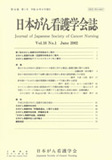Japanese
English
- 販売していません
- Abstract 文献概要
- 参考文献 Reference
- サイト内被引用 Cited by
要 旨
本研究の目的は,終末期ケアの質的向上を推進する継続教育の方向性を検討するために,ジェネラリストとして終末期ケアを行っている臨床看護師の看護観とケア行動,およびその発展過程と影響要因を明らかにすることである.研究に同意が得られた看護師22名に半構成的面接を行い,逐語録の探索型内容分析により看護観・ケア行動・影響要因のカテゴリーを抽出した.また,対象者個々の看護観とケア行動の発展過程を検討し,属性・影響要因との関連をみた.結果,終末期ケアに対する看護観として《ケアに対する姿勢》《人間の見方》《QOLの向上》《終末期ケアの価値》の4カテゴリー,ケア行動として《ニードを知る》《身体的苦痛を緩和する》《家族を支える》《安らぎをもたらす》《病気や死について話し合う》《その人らしさを支える》《信頼関係の基盤をつくる》《環境を調整する》《活力を促進する》の9カテゴリー,影響要因として《個人的要因》《組織上の要因》の2カテゴリーが見出された.発展過程は看護観・ケア行動の深まりの程度に応じⅠ〜Ⅳの発展段階に分類され,年齢・臨床経験年数が高く,終末期ケア経験が5年以上で,役職にあるものが段階が進んでいた.臨床看護師は体験を意味づける(経験化)ことで看護観・ケア行動を再考すること,看護観・ケア行動はフィードバックされ次の体験に変化を及ぼすこと,影響要因が体験の意味づけに作用し看護観・ケア行動の発展に関連しているという構造が見出された.先行研究との比較から,終末期ケアの質的向上のためには看護師個々の倫理観・死生観を深め,霊的ケアを推進すること,組織上の要因を整備していく必要性が示唆された.
Abstract
The purpose of this study was to identify the philosophy of nursing, care behavior, and their developmental process and affecting factors of clinical nurses who participate in care of dying as generalists in order to consider the direction of continuous education to promote qualitative improvement of terminal care. Subjects included 22 clinical nurses who agreed to participate in this study. The qualitative data were collected through semi-structured interviews based on a questionnaire developed by the researchers and analyzed through exploratory content analysis from which a number of relevant categories were induced.
The categories of the philosophy of nursing in terminal care were "attitude on care", "view on human", "improvement of the quality of life", and "value of terminal care" ; those of care behavior were "to find out needs", "to palliate physical pain", "to support family", "to provide inner peace", "to discuss about disease and death", "to support personal sense of identity of patients", "to establish a base of a trustful relationship", "to manage environment", and "to vitalize" ; and those of affecting factors were "personal factors" and "organizational factors". The developmental process was classified into I to IV stages according to the depth of the philosophy of nursing and care behavior. The subjects belonging to the advanced stage group were those who were older, had longer experience, had worked for terminal care for 5 years or a longer period, and were in a managerial position. The following structure was found : nurse practitioners search for the meaning of the personal experience, reconsidering the philosophy of nursing and care behavior ; these are fed back to affect subsequent experience ; and affecting factors influence searching for the meaning of the personal experience and thus are involved in the development of the philosophy of nursing and care behavior.
A comparison with a previous study indicates that it is necessary for nurses to improve their sense of ethics, perceptions of life and death, and spiritual care and for organizational factors to be further improved for promoting qualitative improvement of terminal care.
Copyright © 2002, Japanese Society of Cancer Nursing All rights reserved.


